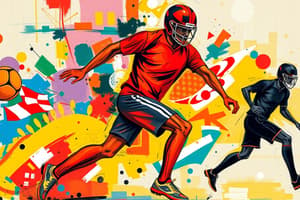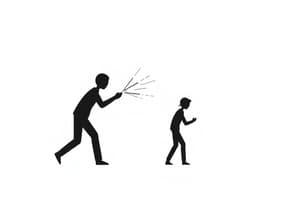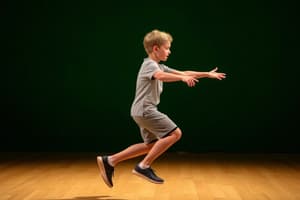Podcast
Questions and Answers
What sets expert performers apart from the rest?
What sets expert performers apart from the rest?
- Automatic (correct)
- Multi-task (correct)
- Anticipate speed (correct)
- Control-peripheral processing (correct)
What is needed to attain expertise?
What is needed to attain expertise?
- Practice (correct)
- Great motivation (correct)
- Knowledge (correct)
- Imagery (correct)
What describes the amount and type of practice characteristic of experts?
What describes the amount and type of practice characteristic of experts?
Intense, deliberate practice with optimal instruction.
What is a characteristic of experts' knowledge structure?
What is a characteristic of experts' knowledge structure?
What is a key aspect of experts' use of vision?
What is a key aspect of experts' use of vision?
What are the stages an individual goes through to attain expertise?
What are the stages an individual goes through to attain expertise?
The Autonomous Stage signifies that a performer can detect all their own errors.
The Autonomous Stage signifies that a performer can detect all their own errors.
The initial stage of learning involves getting the idea of the __________.
The initial stage of learning involves getting the idea of the __________.
What are the two goals a learner works to achieve in the initial stage?
What are the two goals a learner works to achieve in the initial stage?
What summarizes the later stages in Gentile's two stage model?
What summarizes the later stages in Gentile's two stage model?
What is the unique feature of Gentile's later stages?
What is the unique feature of Gentile's later stages?
What is the purpose of closed skills in Gentile's model?
What is the purpose of closed skills in Gentile's model?
What is the aim of open skills in Gentile's model?
What is the aim of open skills in Gentile's model?
Expert performance is fully automated according to Ericsson.
Expert performance is fully automated according to Ericsson.
Flashcards are hidden until you start studying
Study Notes
Characteristics of Expert Performers
- Expertise distinguished by automaticity and the ability to multitask.
- Experts exhibit superior peripheral control, processing speed, and anticipatory skills.
Attaining Expertise
- Requires vital elements such as knowledge, extensive practice, imagery, skill transfer, motivation, and clear goals.
Practice Requirements for Experts
- Intense, deliberate practice is essential, focusing on tailored training with optimal instruction.
Knowledge Structure of Experts
- Expertise involves advanced problem-solving, informed decision-making, and the ability to anticipate events effectively.
Vision Utilization by Experts
- Experts demonstrate faster environmental scanning, greater attention, and the ability to select more meaningful information.
Stages of Learning
- Recognizing the pathway from beginner to expert emphasizes reflection on individual progress and teaching methods tailored to learning stages.
Fitts and Posner's Three-Stage Model
- Learning motor skills progresses through three stages: Cognitive (beginner), Associative (intermediate), and Autonomous (expert).
Cognitive Stage Details
- Focuses on understanding what to do and how to achieve it; characterized by significant errors and reliance on instructions and feedback.
Associative Stage Insights
- Learners begin to link environmental cues to movements, refining their skills with increased consistency and reduced performance variability.
Autonomous Stage Traits
- Skill performance becomes automatic, with minimal performance variability; many errors are self-detected, but often unconscious due to automatic control.
Performer and Performance Changes
- Key changes include improvement rate decline, variations in muscle engagement, energy costs, visual attention, conscious processing, error detection, and brain plasticity.
Practice Specificity Hypothesis
- Learning is influenced by sensory information available during practice, with the retention of specific feedback types needed throughout all learning stages.
Tremblay and Proteau's Findings
- Study on squat lifts where mirror usage led to improved performance; removal caused a 50% increase in knee joint errors, indicating reliance on visual feedback.
Gentile's Two-Stage Model: Initial Stage
- Focuses on understanding the movement concept.
Goals of the Initial Stage
- Organize a movement pattern for success and differentiate between regulatory and non-regulatory environmental factors.
Gentile's Two-Stage Model: Later Stages
- Focus on fixation (closed skills) and diversification (open skills).
Characteristics in the Later Stages
- Involve adapting movements for performance situations, increasing consistency, and performing efficiently.
Unique Features of Gentile's Later Stages
- Specific goals are determined by the skill type being learned.
Closed Skills in Gentile's Model
- Focus on fixation to develop optimal movement patterns for consistent goal achievement.
Open Skills in Gentile's Model
- Emphasize diversification to create adaptable movement patterns for changing environments.
Expert Performance and Automation
- Ericsson argues that expertise is not solely automated; experts need some conscious control for continued improvement and adaptation.
Studying That Suits You
Use AI to generate personalized quizzes and flashcards to suit your learning preferences.




